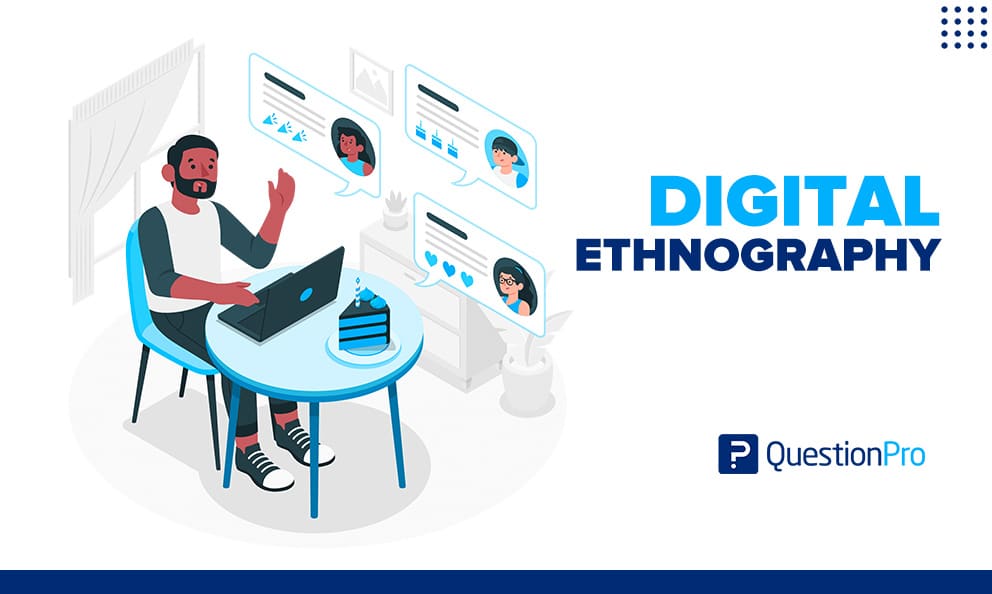 Reading Time: 3 minutes read
Reading Time: 3 minutes readWhy are we just now paying attention to such an essential aspect of our consumer behavior?
Well, there are many reasons for the industry to be interested in this, one of which being its ability to collect large amounts of data from a diverse range of respondents. This allows researchers to understand more accurately how various factors affect cultures using market research techniques such as non-restrictive grouping and qualitative interviews.
Digital ethnography also allows users to practice qualitative analysis on their data, comparing and contrasting it against different sources in order to obtain better results. The overall goal of combining qualitative and quantitative research methods is maximizing the volume and quality of research into a particular area or topic.
What is digital ethnography?
Digital ethnography is a research method that helps researchers gain more insight into participant behavior. It enables a more flexible and efficient capture of information, as respondents can now upload pictures and videos straight to the study in real-time, meaning they can be sure that they’re captured during natural interactions. This means that researchers have access to accurate behavioral data, which helps them build more precise inferences about the direction and extent of their study.
This type of study enables researchers to analyze and observe participants in their natural habitat, basically turning research inside-out by having the researcher come to the research/participant rather than the participant to the researcher.
Well, observing participants in their natural environment paints a much more accurate and authentic portrait than filling out questionnaires or conversing with them over the phone.
Digital Ethnography Benefits
Among the many benefits of digital ethnographic research (also known as Nethnography), we find that it can be conducted in many different ways, among the most popular ones we can find; blogging and video recordings, the usage of online communities. One of the most positive aspects of digital ethnography is the variety in which research can be conducted.
When done right, research can be a fun process that participants will enjoy therefore be more present and engaged which means you’ll not only have better and more accurate results, but there will also reduce the possibiliy of dropouts.
The positive aspect of mobile research is that people engaging with your study are used to using them as part of their everyday lives. You don’t have to be reminding them of using the means for research (mobile). This way the whole process turns into a natural aspect for them, fitting into participants’ routines without disrupting their everyday life.
Another positive aspect of this type of research is the independence that digital ethnography offers, a very extremely unique one, it completely eliminates the need for third parties and external invervention since the means for the research are the own participants mobile, making it not only a familiar process but also a very effective one and not to mention how time effective it is, as the insight gathering happens in real life time as each participant interacts with the product/service that’s being tested.
The digital era proposes many advantages to modern research, with this being said, all digital research presentes an opportunity for a better, greater reach as it is not bound by geographical restrictions nor budgetting, plus the factor that no matter what is happening out there can be carried out.
Let’s take covid for example, traditional research was absolutely impacted by the pandemic, not only forcing researchers to not engage with participants but also restricting the access to them. That’s where digital ethnography comes as the to-go research method.
Digital ethnography is also an aid in gathering consent from research participants, especially when there are sensitivities around what they have experienced. The technology has allowed researchers to become more accessible and transparent with the involvement of new means for data collection.
Conclusion
Qualitative research, particularly online qualitative research, has an increasingly important role to play in the creation of rich insights. As digital technologies constantly evolve, so too does our understanding of what constitutes Ethnography.
Digital Ethnography combines methods from Mobile Ethnography (Focus Group work and Digital Interviews) with other standard methods like IDIs and User Interviews to create a form of qualitative research that is unique and invaluable for clients, customers and stakeholders.
If you want to stay ahead of the innovation game, let QuestionPro Audience be your best ally in your research efforts, and unlock all the power of our software with the human touch of our team!









